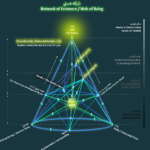How to know the Faithful
Faith is not just a claim; rather, it is a truth that must be proven in belief and practice. In Islamic sources, there are indicators for it, and we mention some examples of the most important ones.
- Persistence and strength in belief
The Quran says:
إِنَّمَا الْمُؤْمِنُونَ الَّذِینَ آمَنُوا بِاللَّهِ وَ رَسُولِهِ ثُمَّ لَمْ یرْتابُوا وَ جاهَدُوا بِأَمْوالِهِمْ وَ أَنْفُسِهِمْ فِی سَبِیلِ اللَّهِ أُولئِک هُمُ الصَّادِقُونَ[1]
Believers are the only ones who believed in God and His Messenger then did not hesitate and fought in the way of God with their property and lives. They are the truthful ones.
Therefore, the sign of true faith is steadfastness and lack of doubt in it, and one of the signs of faith is Jihad with wealth and life in the way of God, and without that faith, it is nothing more than a slogan.
- Ridha and Taslīm (Satisfaction and Submission)
بای شی ءٍ تُعرَفُ المُؤمِن بأنه مؤمن؟ قال: بالتسلیم للَّه والرضا فیما وَرَدَ علیه مِن سرورٍ او سخطٍ؛[2]
Imam Sadiq AS was asked: How can one recognize a faithful? He said: By surrendering to God and being satisfied with what happens, whether in things that is a source of joy or in things that are a source of sadness.
Imam Baqir AS, said: The Messenger of God was on a journey. A caravan met him, and they greeted the Prophet, may God bless him and grant him peace, and said: Who are you? They said: O Messenger of God, we are a group of believers. Imam asked: What is the truth of your faith? They said: Being satisfied with God’s decree, leaving matters to God, and submitting to God’s command. The Prophet said: If you are telling the truth, do not build a building in which you do not sit, and do not collect what you do not eat, and fear God to whom you return.[3]
- Honesty
Imam Ali AS said:
: الْإِیمَانُ أَنْ تُؤْثِرَ الصِّدْقَ حَیثُ یضُرُّک عَلَی الْکذْبِ حَیثُ ینْفَعُک؛[4]
The sign of faith is to choose the truth over falsehood; although it caused loss and this brought profit.
- Self-control
The Prophet SAWA said:
إِنَّمَا الْمُؤْمِنُ الَّذِی إِذَا غَضِبَ لَمْ یخْرِجْهُ غَضَبُهُ مِنْ حَقٍّ؛[5]
A faithful is a person who does not take him out of the circle of truth when anger takes over him.
- Displeasure with sin
The Prophet SAWA said:
مَن سَرَّتْهُ حَسَنَتهُ وَ ساءَتْهُ سَیئَتُهُ فَهُوَ مُؤمِن؛[6]
Whoever is pleased with his good deeds and saddened by his bad deeds is a faithful.
- Obedience to God
Imam Sadiq AS said:
الْإِیمَانُ مَا اسْتَقَرَّ فِی الْقَلْبِ وَ أَفْضَی بِهِ إِلَی اللَّهِ عَزَّ وَ جَلَّ وَ صَدَّقَهُ الْعَمَلُ بِالطَّاعَةِ لِلَّهِ وَ التَّسْلِیمِ لِأَمْرِهِ؛[7]
Faith is that which is settled in the heart, and draws the servant to God. Its sign is obedience to God and submission to His command.
Imam Sadiq AS was asked:
قُلْتُ لَهُ بِأَيِّ شَيْءٍ يُعْلَمُ الْمُؤْمِنُ بِأَنَّهُ مُؤْمِنٌ قَالَ بِالتَّسْلِيمِ لِلَّهِ وَ الرِّضَا فِيمَا وَرَدَ عَلَيْهِ مِنْ سُرُورٍ أَوْ سَخَطٍ.[8]
How one is understood to be a faithful? He said: By surrendering to God and being pleased with everything that comes to him from sadness and happiness.
- Trustworthiness
Imam Sadiq AS, said:
لَا تَنْظُرُوا إِلَى طُولِ رُكُوعِ الرَّجُلِ وَ سُجُودِهِ فَإِنَّ ذَلِكَ شَيْءٌ اعْتَادَهُ فَلَوْ تَرَكَهُ اسْتَوْحَشَ لِذَلِكَ وَ لَكِنِ انْظُرُوا إِلَى صِدْقِ حَدِيثِهِ وَ أَدَاءِ أَمَانَتِهِ[9]
Do not look at the length of a person’s bowing and prostration [in his Salāt]; Indeed, worship is something that he has become accustomed to, and if he leaves it, he will be afraid, but look at the sincerity in his speech and the performance of his trust.
- Halal income and good behaviour
Imam Sadiq AS, said:
المؤمن من طاب مکسَبُه و حَسُنَت خلیقته و صحت سریرتهُ و انفق الفضل من ماله و امسک الفضل من کلامه[10]
The faithful is blessed with the goodness of his creation and the health of his body, and he spends his wealth and holds his wealth with his words. A faithful is a person who has pure earnings and a good behaviour, and spends the surplus of his wealth and abstains the surplus of his speech.
Resources
[1] Hujuraat, 15.
[2] Kafi, vol. 2, p. 62.
[3] Kafi, vol. 3, p. 88; Bihar al-Anwar, vol. 64, p. 286.
[4] Nahj al-Balaghah, Qisar 458.
[5] Kafi, vol. 2, p. 233.
[6] Bihar al-Anwar, vol. 64, p. 350.
[7] Kafi, vol. 2, p. 26.
[8] Kafi, vol. 2, p. 62.
[9] Kafi, vol. 2, p. 105.
[10] Bihar al-Anwar, vol. 67, p. 293.








